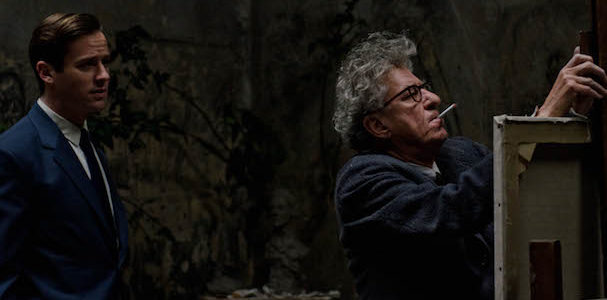
ReelBob: ‘Final Portrait’ ★★★
By Bob Bloom
Stanley Tucci has an affinity for artists — whether they be in a kitchen, as in his “Big Night,” or in a workshop-studio, the main locale of his latest project, “Final Portrait.”
The premise is simple, yet fraught with obstacles, as Tucci tells the story of the offbeat friendship between American writer and art-lover James Lord (Armie Hammer) and artist Alberto Giacometti (Geoffrey Rush).
The setting is Paris in 1964. Lord is visiting the city when Giacometti asks his friend to sit for a portrait, telling Lord that it will only take a day or two.
Tucci is basically painting a picture of his own — focusing on the difficulty and unpredictability of the creative process.
Lord is totally unprepared for what lies ahead when he agrees to pose. Giacometti paints a few brushstrokes, then stops.
This goes on for days, as Giacometti rants about his inability to capture what he believes is Lord’s essence.
The artist continually is unsatisfied with his work, threatening almost daily to abandon the project and beginning over again and again.
As the time passes, Lord grows more and more frustrated, continuing to cancel his flight plans and wondering how much longer he will need to stay in Paris.
He puts his life on hold, catering to Giacometti’s insecurities about his own gifts.
Hammer has a beautiful face; one that any artist would love to capture. And, Tucci deliberately inserts several point-of-view close-ups of Hammer’s face from Giacometti’s perspective, as he tries to copy it onto canvas.
Rush embraces Giacometti’s mercurial and self-doubting nature — the way he continually fusses over his sculptures, his temperamental mood swings and his self-absorption.
Giacometti, his patient, but exasperated wife, Annette and Giacometti’s brother, Diego, all live in a secluded ramshackle residence off a back alley.
Theirs is a bohemian lifestyle — Alberto has a prostitute mistress, while Annette has an occasional lover. Diego concentrates on his own artistic endeavors, keeping out of his brother and sister-in-law’s affairs.
Though “Final Portrait” only runs about 90 minutes, it does feel longer. It is difficult to produce a movie about the artistic process. You simply cannot speed up the pace in which an artist sits in front of a canvas, studying his sitting subject; then, going to work in short bursts before becoming irritated and stopping.
It definitely becomes repetitious. In a way, though, it also draws you in and gives you an appreciation of how a creative mind works.
Rush has the ability to make Giacometti’s eccentricities tolerable because Tucci, at times, uses his camera to show the world through Giacometti’s eyes.
“Final Portrait” is a slow movie, especially in these times when audiences are conditioned to CGI effects and split-second editing.
But that should not deter you from seeing this intimate feature. It is not a paint-by-the-numbers biopic or memoir.
Rather, it’s a study of the mental struggles or the difficulties facing an artist, trying to remain true to himself.
I am a member of the Indiana Film Journalists Association. My reviews appear at ReelBob (reelbob.com) and Rottentomatoes (www.rottentomatoes.com). I also review Blu-rays and DVDs. I can be reached by email at bobbloomjc@gmail.com or on Twitter @ReelBobBloom. Links to my reviews can be found on Facebook, Twitter, Google+ and LinkedIn.
FINAL PORTRAIT
3 stars out of 4
(R), language, nudity, sexual references